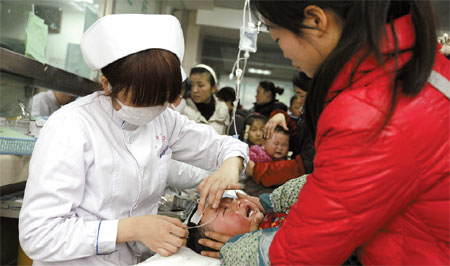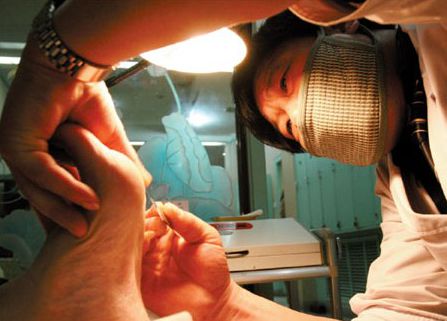

The Spring Festival is a season of fun for all Chinese, but too much eating and drinking can pose many risks, medical experts tell Liu Zhihua.
With the Spring Festival - the most important celebration of the year for the Chinese - arriving in about one week, people are getting excited about the coming seven-day holiday. Some will celebrate even longer, as the festival traditionally lasts throughout the first half of the first lunar month.
Yet while most people will leave their regular work for family time and big feasts, medical professionals, especially those in emergency departments, will get increasingly busy.
"While people are relaxed and enjoying the holiday, we actually raise the numbers of ambulances and physicians on duty to make sure that people's happiness can last," says Liu Hongmei, vice director of the Beijing Emergency Medical Center, better known as Beijing 120.
She says the use of ambulances at the center usually increases 10 percent during the festival.
Yang Xu, an emergency physician who has worked at Beijing 120 for 13 years, says there is a spike in incidents of stroke, heart conditions, injuries, alcohol intoxication and stomach upset during the holiday period.
"On Spring Festival, when people leave their normal routines for holiday fun, they tend to indulge at get-togethers, parties, feasts and late nights. Many are not aware of the health risks in those holiday activities," Yang says, adding that the winter cold poses a higher risk for brain and cardiovascular disease - the leading causes of emergency calls year-round.
Alcohol intoxication cases rise as much as 10 percent during the holiday. Injuries, usually from fireworks explosions, car accidents, fighting, skiing and skating, together with severe stomach upset, often rank among the top causes of ambulance calls, according to Beijing 120's Liu.
"Every Spring Festival, we have to remove eyeballs from people who are badly hurt by fireworks," says Zheng Ya'an, director with the emergency department of Peking University Third Hospital.
Fireworks accidents mostly hurt eyes and fingers, which are small but important for quality life. With the improved quality of fireworks in recent years, such accidents are less common than a decade ago, but several cases occur every Spring Festival, Zheng says.
Dangers of excess
The department also treats people who have been injured in fights started under the influence of alcohol. Bottles often turn into weapons that combatants throw at each other's heads, Zheng says.
But while alcohol sometimes makes people lose rational control and fight, the greatest danger it causes is intoxication.
"For the Chinese, a feast cannot be a feast without alcohol, and people are used to drunkenness," he says.
"But drunkenness is actually a form of alcohol intoxication, and is dangerous."
At a low level, alcohol intoxication makes people flushed and it inhibits physical movement. People lose balance, which may lead to dangerous falls.
When nausea and coma occur, there are chances that a drunk person will be suffocated by vomit.
In extreme cases, the depressive effects of alcohol upon the central nervous system can lead directly to death, when vital functions such as the heartbeat and breathing are seriously affected, Zheng says.
An uncontrolled feast, however, can do as much harm as alcohol poisoning, he says.
Hospitals these days have few patients suffering from stomach upset caused by unclean food, as living standards have improved. During holidays, though, people tend to eat more and irregularly, which often triggers stomach pain, vomiting and diarrhea, according to Zheng.
Such suffering occurs easily among those who have worked under great pressure and already have inflammations or ulcers in the digestive tract. Sometimes, a few days of binge eating can lead to severe illness, such as acute pancreatitis, or inflammation of the pancreas, which requires immediate medical care and can be lethal.
For people with chronic diseases, the problems are more complex. The cold weather during Spring Festival increases the risk or severity of chronic diseases, including stroke, high blood pressure and heart disease.
Excitement, tiredness and food rich in oil and fat, which are common during the holiday, are bad for chronic disease control, such as diabetes and high blood sugar and cholesterol.
"There is always temptation to abandon healthy living routines, to eat too much and not to get enough exercise, when everyone is cheerful and enjoying a good time," says a 59-year-old woman surnamed He, who lives in Ankang, Shaanxi province, and has high blood pressure.
Zhou Aiguo, vice-director with the emergency department of Beijing Hospital of Traditional Chinese Medicine, notes uncontrolled eating, emotional changes and fatigue all contribute to a rise in strokes and heart attacks among seniors who feast and stay up late.
He always remembers an elderly woman patient, who died from a heart attack after working a whole day to prepare food for a big family.
"She was happy because Spring Festival was the opportunity to have all the family members gather together," Zhou says.
"But her death could have been avoided, if she didn't let herself get so tired and excited."
To make things worse, some Chinese people, usually seniors, often refuse to stay hospitalized, or do not take medicine during the holiday, considering hospitalization and medicine bad omens at the beginning of a year.
"The majority of my patients hold such thoughts, and some put them into action," Zhou says.
"If the family know the seniors don't have medicine, they may be alert. But many of the elderly sneakily throw away their medicine."
Contact the writer at liuzhihua@chinadaily.com.cn.
 |
|
The First People's Hospital in Xiangyang, Hubei province is filled with children who suffer the festival illness. Physicians warn people should not eat or drink too much and become too tired during the celebrations. Gong Bo / for China Daily |
 |
|
A podiatrist at Beijing's time-honored Qinghuachi Bathhouse provides treatment to a customer. Many people get foot diseases because of frequent walking and fair visits during the Spring Festival. Chen Xiaogen / for China Daily |